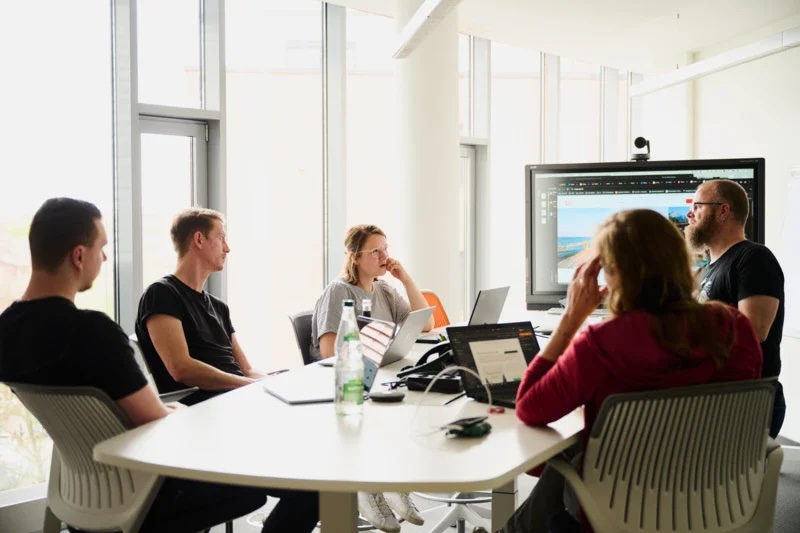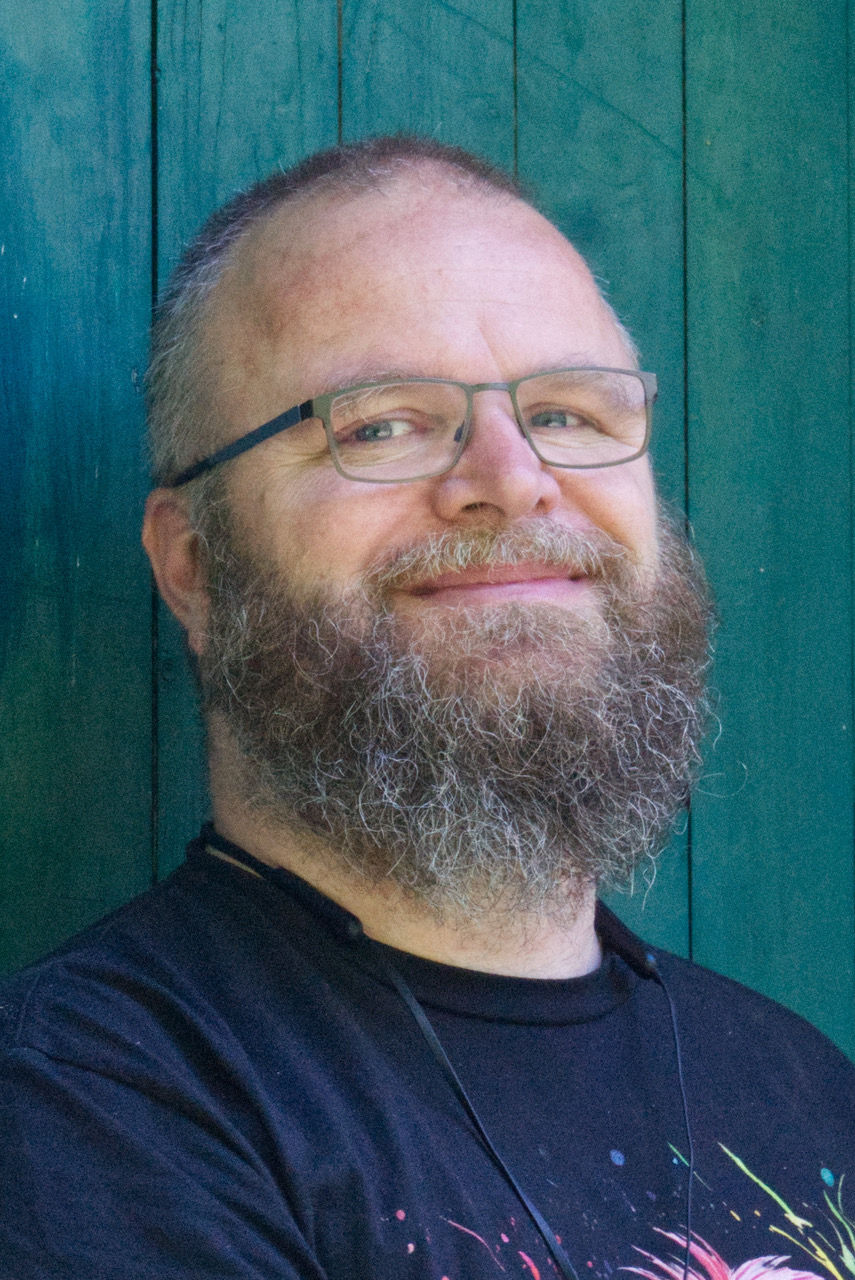Why television advertising prompted the sitegeist agency to use Flownative Beach
The Hamburg-based digital agency sitegeist is an experienced player in the Neos ecosystem. It has been actively involved in Neos from the very beginning, employs its own core developers and has been actively shaping the open source project for years.
Martin Ficzel, Senior Developer at sitegeist and member of the Neos core team, looks after some of the most important Neos customers and knows exactly what can keep you awake at the weekend. He spoke to us about different colored Deployments, magic wands and clear responsibilities.

The Neos team at sitegeist mainly works on complex projects for the tourism sector
It's Sunday evening, 8:15 pm, prime time. Somewhere on TV, a commercial for a large hotel chain is playing. Martin Fizcel is relaxing with his family when suddenly ... nothing happens. The customer's website continues to run just as relaxed, while the server infrastructure scales automatically in the background.
"There is simply a situation where advertising is shown on television and a peak load is to be expected," explains the Senior Developer at Hamburg-based digital agency sitegeist matter-of-factly. "That's the reason why our customer asked for a scalable hosting solution. And he was absolutely right."
Magic Wand and other secrets
If you want to get to know Martin and his team at sitegeist better, you first have to understand their passion for creative names. There are packages with names such as "Sitegeist Magic Wand", "Klar Schiff" or other imaginative names that have long since achieved cult status in the Neos community. "Since then, we've been aiming to find an original name for every package," grins Martin. "It's always discussed briefly in the team. It should always have something to do with the topic, but also make people think and smile."
Sitegeist has now published more than 50 extensions for Flow and Neos. What looks like a nice gesture, however, has another important background. "We publish this because it makes our work easier," explains the developer, who has been working at sitegeist for almost ten years. Each external package forces the team to use clean architecture and at the same time makes it possible to use solutions across projects. "The code doesn't become less because you share and publish it, it just becomes easier to use."
Customized booking routes
At sitegeist, everything revolves around tourism. The team develops websites for several hotel chains, "including meta-companies that operate several hotel chains", as Martin Ficzel explains. This involves "large websites for dozens of hotels including booking routes" - but not standard off-the-shelf software.
"Not just any booking route, but a booking route that makes sense for this particular hotel chain," he emphasizes. The effort is worth it: "It has a clear impact on success if you don't take it off the shelf, but build it yourself and then continuously develop it further."
» The classic problem is always: Who is responsible? «
Back to the problem with TV advertising. Before sitegeist could even think about scaling, another hurdle had to be overcome - one that almost every web developer knows.
"The classic problem is always: who is responsible?" says Martin, describing the dilemma. "There is the administration and the application level, and it becomes really difficult at the latest when it comes to the web server configuration, where it is no longer clear who is responsible."
This sounds theoretical, but quickly becomes very practical: "There is always this unclear area, and funny bugs happen in it. And things happen that no one feels responsible for at first, which only then become apparent to the customer." With a hotel booking system, this can be expensive - in the truest sense of the word.
From TYPO3 to Neos: A pragmatic path
Martin Ficzel's path into web development began pragmatically: "I asked people who had just come out of university: What CMS would you use?" TYPO3 was the first keyword. After years of using the system, Neos came into play. "Neos mapped the things we wanted from TYPO3 a little better. Even more direct, even more flexible."
He was particularly taken with the content modeling: "It was the self-modeling of the content that appealed to me, which we have been doing very intensively ever since. Since then, I haven't really felt the need to use anything else."
Outsourcing expertise
The first major collaboration with Flownative came about during a challenging project for a large service provider in the entertainment industry. sitegeist was to operate Neos in a highly scalable manner with Kubernetes in the customer infrastructure. "We simply outsourced the Kubernetes issues to Flownative because we don't have any expertise of our own, at least not at this level," explains Martin.
The project also worked well because the boundaries were clearly defined: sitegeist took on the application logic, Flownative the infrastructure. A division of labor that would later become a model for other projects.

Martin Ficzel has been a passionate member of the Neos core team for many years|Photo: Privat
Beach or the art of not having to do everything yourself
The decisive step came with a major project for a hotel chain. The problem: television advertising and the resulting peak loads. "That's why we wanted a system that could be scaled up at short notice as required and scaled down again when the peak load was over."
The alternative would have been a self-built Kubernetes setup. "Then the question would have been: Who would be responsible for it? That would have meant a huge administrative task," says Martin. " Beach takes that off our hands completely. We have a scalable environment without having to operate Kubernetes ourselves."
Support without a "the server is running" mentality
What sitegeist particularly appreciates about Flownative is the direct access to other Neos experts. "I can't think of anyone at Flownative who wouldn't be able to solve a Neos problem straight away," says Martin. The difference to other hosters quickly becomes clear: "With most other admins, you hear very quickly: So our server is running, I don't know what your application is doing there, you'll have to take a look yourself."
This is technically correct, but not helpful. "That's something we've never experienced at Flownative. You really always looked right into the application and found a solution to solve the problem - not just get the server to deliver status 200."
Blue-green Deployments
One of Martin Ficzel's favorite functions in Beach is the blue-green Deployments. "This is an environment variable that alternates between green and blue for each Deployment," he explains the simple function. "This allows us to work with two separate caches during the Deployments - the one that is currently live and the one that should take over after the Deployment. This ensures that a Deployment can start with empty caches without destroying the caches for the last pods of the last Deployments. This is one of the big learnings from cloud operation."
Such features are the result of direct collaboration between sitegeist and Flownative. "Beach is super opinionated," explains Martin. "It abstracts a lot away from us, but these are also things that we don't have to worry about on a day-to-day basis. If we need a special setting, we rely on cooperation - and so far we've always found a solution."
The price of scalability
Of course, cloud operation comes at a price - and not just financially. "A clustered system is always a tad slower because systems for caches and databases communicate via the local network," explains Martin honestly. "On the other hand, a system on a physical machine doesn't have the scalability and reliability."
» If you mainly use Neos or Flow, I don't see why you should use anything else «
Optimization for cluster operation is a "never-ending process", but also a learning process. "You have to think about it: Which caches are on the individual pods, which are shared, which need to be updated at Deployment. But we also work in the interests of our customers with a standard that can't be beaten by simple, one-size-fits-all solutions."
A recommendation for professionals
"If you mainly run Neos or Flow, I don't see why you should use anything else," says Martin Ficzel, summarizing his Beach recommendation. The future security is particularly convincing: "You can start small, but I find it super helpful to plan for scalability right from the start with anything that is professional."
Today, several years after the first Beach project, Martin draws a positive conclusion. The problem of blurred responsibilities? Solved. "I am only responsible for the application layer and Flownative is fully responsible for the infrastructure layer. We know exactly who is responsible for what."
And if TV advertising causes peak loads again? "With Beach, you simply know exactly: this is an option that I have at all times - even under time pressure."